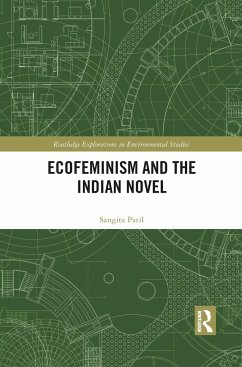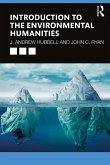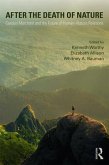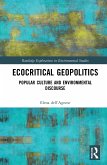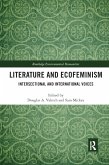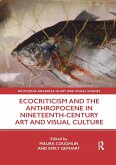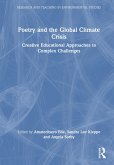Sangita Patil
Ecofeminism and the Indian Novel
Sangita Patil
Ecofeminism and the Indian Novel
- Broschiertes Buch
- Merkliste
- Auf die Merkliste
- Bewerten Bewerten
- Teilen
- Produkt teilen
- Produkterinnerung
- Produkterinnerung
Ecofeminism and the Indian Novel tests the theories of ecofeminism against the background of Indiaâ s often different perceptions of environmental problems, challenging the hegemony of Western culture in thinking about human problems.
Andere Kunden interessierten sich auch für
![Introduction to the Environmental Humanities Introduction to the Environmental Humanities]() J. Andrew HubbellIntroduction to the Environmental Humanities38,99 €
J. Andrew HubbellIntroduction to the Environmental Humanities38,99 €![After the Death of Nature After the Death of Nature]() After the Death of Nature40,99 €
After the Death of Nature40,99 €![Poetry and the Global Climate Crisis Poetry and the Global Climate Crisis]() Poetry and the Global Climate Crisis38,99 €
Poetry and the Global Climate Crisis38,99 €![Ecocritical Geopolitics Ecocritical Geopolitics]() Elena dell'AgneseEcocritical Geopolitics42,99 €
Elena dell'AgneseEcocritical Geopolitics42,99 €![Literature and Ecofeminism Literature and Ecofeminism]() Literature and Ecofeminism47,99 €
Literature and Ecofeminism47,99 €![Ecocriticism and the Anthropocene in Nineteenth-Century Art and Visual Culture Ecocriticism and the Anthropocene in Nineteenth-Century Art and Visual Culture]() Ecocriticism and the Anthropocene in Nineteenth-Century Art and Visual Culture42,99 €
Ecocriticism and the Anthropocene in Nineteenth-Century Art and Visual Culture42,99 €![Poetry and the Global Climate Crisis Poetry and the Global Climate Crisis]() Poetry and the Global Climate Crisis152,99 €
Poetry and the Global Climate Crisis152,99 €-
-
-
Ecofeminism and the Indian Novel tests the theories of ecofeminism against the background of Indiaâ s often different perceptions of environmental problems, challenging the hegemony of Western culture in thinking about human problems.
Hinweis: Dieser Artikel kann nur an eine deutsche Lieferadresse ausgeliefert werden.
Hinweis: Dieser Artikel kann nur an eine deutsche Lieferadresse ausgeliefert werden.
Produktdetails
- Produktdetails
- Routledge Explorations in Environmental Studies
- Verlag: Taylor & Francis Ltd
- Seitenzahl: 162
- Erscheinungstermin: 30. Juni 2021
- Englisch
- Abmessung: 234mm x 156mm x 9mm
- Gewicht: 244g
- ISBN-13: 9781032091181
- ISBN-10: 1032091185
- Artikelnr.: 62150250
- Herstellerkennzeichnung
- Libri GmbH
- Europaallee 1
- 36244 Bad Hersfeld
- gpsr@libri.de
- Routledge Explorations in Environmental Studies
- Verlag: Taylor & Francis Ltd
- Seitenzahl: 162
- Erscheinungstermin: 30. Juni 2021
- Englisch
- Abmessung: 234mm x 156mm x 9mm
- Gewicht: 244g
- ISBN-13: 9781032091181
- ISBN-10: 1032091185
- Artikelnr.: 62150250
- Herstellerkennzeichnung
- Libri GmbH
- Europaallee 1
- 36244 Bad Hersfeld
- gpsr@libri.de
Dr Sangita Patil is an Assistant Professor at LBS Govt First Grade College, Bengaluru, India. Her research interests include Ecofeminism, Literary Theory, Cultural Studies and Liberal Education.
Introduction: Ecofeminism and the Indian Novel
Introduction
Ecofeminism: Environmental Studies and Feminism
Ecofeminism: Indian Polemical Discourse
Indian Novel
1 An Interface between Human Beings and Nature
1.1 Introduction
1.2 The Genealogy of Ecofeminism
1.3 Indian Polemical Discourse: Environment and Ecofeminism
1.4 The Genealogy of Indian Novel
1.5 The Discursive Formation of the Environment in Indian Novel
1.6 Rumination on Indian Environment Movements and Protest
1.7 Conclusion: The Formulation of Framework
2 Agriculture as an Ecofeminist Concern: Nectar in a Sieve, The Upheaval,
Return to Earth
and Gift in Green
2.1 Introduction
2.2 Nectar in a Sieve: The Impact of Tannery on Pastoral Life
2.3 The Upheaval: The Impact of Mining on Farming Community
2.4 Shivram Karanth's Return to Earth: The Impact of Modernization on
Agrarian Culture
2.5 Sarah Joseph's Gift in Green: A Toxic Discourse
3 Dam Construction and Ecological Crisis: The Coffer Dams and Dweepa
3.1 Introduction
3.2 The Project of Dam Construction and Ecological Crisis in India
3.3 Kamala Markandaya's The Coffer Dams: Modern Juggernaut
3.4 Na D' Souza's Dweepa: An Island of Destruction
4 The Industrial Disaster: Animal's People
4.1 Introduction
4.2 The Bhopal Gas Tragedy: A Backdrop
4.3 Patriarchal Developmental Attitude: Industrial Disaster
4.4 Women as Victim of the Industrial Disaster
4.5 Rhetorical Tropes
4.6 The Uniqueness of Animal's People as an Ecohumanist Narrative
5 Animals as Absent Referents: The Man from Chinnamasta
5.1 Introduction
5.2 The Mythological Background
5.3 The Ethnography of Animal Sacrifice
5.4 Patriarchy and Animal Sacrifice
5.5 Women's Concern for Animals
5.6 The Uniqueness of The Man from Chinnamasta as an Ecofeminist Narrative
6 Reconceptualizing Ecofeminism: From Ecofeminism to Ecohumanism
6.1 Introduction
6.2 An Overview of the Ecofeminist Concern
6.3 Reconceptualizing Ecofeminism: From Feminism to Humanism
6.4 Conceptual Framework
Introduction
Ecofeminism: Environmental Studies and Feminism
Ecofeminism: Indian Polemical Discourse
Indian Novel
1 An Interface between Human Beings and Nature
1.1 Introduction
1.2 The Genealogy of Ecofeminism
1.3 Indian Polemical Discourse: Environment and Ecofeminism
1.4 The Genealogy of Indian Novel
1.5 The Discursive Formation of the Environment in Indian Novel
1.6 Rumination on Indian Environment Movements and Protest
1.7 Conclusion: The Formulation of Framework
2 Agriculture as an Ecofeminist Concern: Nectar in a Sieve, The Upheaval,
Return to Earth
and Gift in Green
2.1 Introduction
2.2 Nectar in a Sieve: The Impact of Tannery on Pastoral Life
2.3 The Upheaval: The Impact of Mining on Farming Community
2.4 Shivram Karanth's Return to Earth: The Impact of Modernization on
Agrarian Culture
2.5 Sarah Joseph's Gift in Green: A Toxic Discourse
3 Dam Construction and Ecological Crisis: The Coffer Dams and Dweepa
3.1 Introduction
3.2 The Project of Dam Construction and Ecological Crisis in India
3.3 Kamala Markandaya's The Coffer Dams: Modern Juggernaut
3.4 Na D' Souza's Dweepa: An Island of Destruction
4 The Industrial Disaster: Animal's People
4.1 Introduction
4.2 The Bhopal Gas Tragedy: A Backdrop
4.3 Patriarchal Developmental Attitude: Industrial Disaster
4.4 Women as Victim of the Industrial Disaster
4.5 Rhetorical Tropes
4.6 The Uniqueness of Animal's People as an Ecohumanist Narrative
5 Animals as Absent Referents: The Man from Chinnamasta
5.1 Introduction
5.2 The Mythological Background
5.3 The Ethnography of Animal Sacrifice
5.4 Patriarchy and Animal Sacrifice
5.5 Women's Concern for Animals
5.6 The Uniqueness of The Man from Chinnamasta as an Ecofeminist Narrative
6 Reconceptualizing Ecofeminism: From Ecofeminism to Ecohumanism
6.1 Introduction
6.2 An Overview of the Ecofeminist Concern
6.3 Reconceptualizing Ecofeminism: From Feminism to Humanism
6.4 Conceptual Framework
Introduction: Ecofeminism and the Indian Novel
Introduction
Ecofeminism: Environmental Studies and Feminism
Ecofeminism: Indian Polemical Discourse
Indian Novel
1 An Interface between Human Beings and Nature
1.1 Introduction
1.2 The Genealogy of Ecofeminism
1.3 Indian Polemical Discourse: Environment and Ecofeminism
1.4 The Genealogy of Indian Novel
1.5 The Discursive Formation of the Environment in Indian Novel
1.6 Rumination on Indian Environment Movements and Protest
1.7 Conclusion: The Formulation of Framework
2 Agriculture as an Ecofeminist Concern: Nectar in a Sieve, The Upheaval,
Return to Earth
and Gift in Green
2.1 Introduction
2.2 Nectar in a Sieve: The Impact of Tannery on Pastoral Life
2.3 The Upheaval: The Impact of Mining on Farming Community
2.4 Shivram Karanth's Return to Earth: The Impact of Modernization on
Agrarian Culture
2.5 Sarah Joseph's Gift in Green: A Toxic Discourse
3 Dam Construction and Ecological Crisis: The Coffer Dams and Dweepa
3.1 Introduction
3.2 The Project of Dam Construction and Ecological Crisis in India
3.3 Kamala Markandaya's The Coffer Dams: Modern Juggernaut
3.4 Na D' Souza's Dweepa: An Island of Destruction
4 The Industrial Disaster: Animal's People
4.1 Introduction
4.2 The Bhopal Gas Tragedy: A Backdrop
4.3 Patriarchal Developmental Attitude: Industrial Disaster
4.4 Women as Victim of the Industrial Disaster
4.5 Rhetorical Tropes
4.6 The Uniqueness of Animal's People as an Ecohumanist Narrative
5 Animals as Absent Referents: The Man from Chinnamasta
5.1 Introduction
5.2 The Mythological Background
5.3 The Ethnography of Animal Sacrifice
5.4 Patriarchy and Animal Sacrifice
5.5 Women's Concern for Animals
5.6 The Uniqueness of The Man from Chinnamasta as an Ecofeminist Narrative
6 Reconceptualizing Ecofeminism: From Ecofeminism to Ecohumanism
6.1 Introduction
6.2 An Overview of the Ecofeminist Concern
6.3 Reconceptualizing Ecofeminism: From Feminism to Humanism
6.4 Conceptual Framework
Introduction
Ecofeminism: Environmental Studies and Feminism
Ecofeminism: Indian Polemical Discourse
Indian Novel
1 An Interface between Human Beings and Nature
1.1 Introduction
1.2 The Genealogy of Ecofeminism
1.3 Indian Polemical Discourse: Environment and Ecofeminism
1.4 The Genealogy of Indian Novel
1.5 The Discursive Formation of the Environment in Indian Novel
1.6 Rumination on Indian Environment Movements and Protest
1.7 Conclusion: The Formulation of Framework
2 Agriculture as an Ecofeminist Concern: Nectar in a Sieve, The Upheaval,
Return to Earth
and Gift in Green
2.1 Introduction
2.2 Nectar in a Sieve: The Impact of Tannery on Pastoral Life
2.3 The Upheaval: The Impact of Mining on Farming Community
2.4 Shivram Karanth's Return to Earth: The Impact of Modernization on
Agrarian Culture
2.5 Sarah Joseph's Gift in Green: A Toxic Discourse
3 Dam Construction and Ecological Crisis: The Coffer Dams and Dweepa
3.1 Introduction
3.2 The Project of Dam Construction and Ecological Crisis in India
3.3 Kamala Markandaya's The Coffer Dams: Modern Juggernaut
3.4 Na D' Souza's Dweepa: An Island of Destruction
4 The Industrial Disaster: Animal's People
4.1 Introduction
4.2 The Bhopal Gas Tragedy: A Backdrop
4.3 Patriarchal Developmental Attitude: Industrial Disaster
4.4 Women as Victim of the Industrial Disaster
4.5 Rhetorical Tropes
4.6 The Uniqueness of Animal's People as an Ecohumanist Narrative
5 Animals as Absent Referents: The Man from Chinnamasta
5.1 Introduction
5.2 The Mythological Background
5.3 The Ethnography of Animal Sacrifice
5.4 Patriarchy and Animal Sacrifice
5.5 Women's Concern for Animals
5.6 The Uniqueness of The Man from Chinnamasta as an Ecofeminist Narrative
6 Reconceptualizing Ecofeminism: From Ecofeminism to Ecohumanism
6.1 Introduction
6.2 An Overview of the Ecofeminist Concern
6.3 Reconceptualizing Ecofeminism: From Feminism to Humanism
6.4 Conceptual Framework

